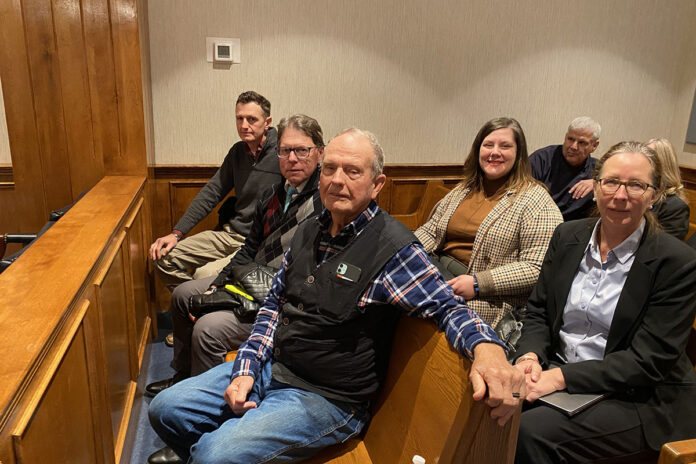
LIMA, Ohio — A Union County farm family is continuing to oppose construction of a natural gas pipeline across their preserved farmland in a case before Ohio’s Third District Court of Appeals. Meanwhile, administrative changes at the Ohio Department of Agriculture, as well as proposed changes to Ohio’s eminent domain laws, could affect similar cases in the future.
On Nov. 22, the Third District Court of Appeals heard oral arguments for two linked cases, Columbia Gas of Ohio, Inc. v. Patrick E. Bailey, et al. and Columbia Gas of Ohio, Inc. v. Don Bailey Jr., et al. These cases appeal a Union County Common Pleas Court ruling in April that dismissed Columbia Gas’s request to use eminent domain for pipeline construction.
The lower court dismissed Columbia Gas’s eminent domain petition citing inconsistencies in the language used in documents provided to the court and those reviewed by the Ohio Power Siting Board. A 25-foot easement labeled “temporary” before the siting board was listed as “perpetual” in the eminent domain request to the court.
Appeals
In the appeal before the district court, the Bailey family is asking the court to uphold the lower court’s dismissal of the eminent domain request, based on the inconsistent perpetual/temporary easement descriptions.
The appeals court has already ruled on a case involving a neighboring farm, Columbia Gas of Ohio, Inc. v. Phelps Preferred Investments, LLC. The Phelps case involved the same inconsistent easement descriptions. In July, the appeals court upheld the lower court’s dismissal of the eminent domain request.
The Phelps case is different from the Baileys’, however, because the Phelps farmland is not protected by an ag easement. The Baileys want the appeals court to go a step further in their cases to consider the ag easement and deny the eminent domain request because the ag easement establishes a “prior public use.”
In the Union County Court case, the judge had taken the opposite position, stating that the existing ag easement did not prevent eminent domain action. In support of the Baileys’ position as the case has moved forward, the Ohio Farm Bureau, the Union County Farm Bureau and the Coalition of Ohio Land Trusts jointly submitted a brief to the appeals court. The brief included arguments against granting the eminent domain request, citing the state’s prior public use doctrine.
“The lower court failed to appropriately recognize that the proposed taking by Columbia Gas would destroy and severely inhibit the prior public use of the agricultural easement in question in this case,” the brief said.
ODA involvement
The Bailey family’s preserved farmland was protected with an agricultural easement in 2003 by Don Bailey’s uncle, Arno Renner, who owned the land at that time. Renner donated the agricultural easement on the land to ODA.
The ODA’s response to eminent domain threats to the preserved farmland has varied over time, Don Bailey said. In 2005, Ohio Department of Agriculture Director Fred Dailey opposed installation of a sanitary sewer pipeline across the preserved Renner farm and that pipeline was re-routed. The ODA defended the easement again against a proposed water pipeline a few years later. More recently, however, the ODA, now headed by Director Dorothy Pelanda, did not oppose construction of the Columbia Gas pipeline.
Leadership of the ODA will be changing again in 2023, since Pelanda has announced her retirement, effective Dec. 31. A new director for the department has not yet been named.
In 2023, the ODA’s Office of Farmland Preservation will also be using updated ag easement deed language that more specifically identifies permitted uses of preserved land.
Laura Curliss, an attorney working with the Bailey family, told the Farm and Dairy that those changes take the program further down the wrong path.
“Our easements, that are paid for with public money, are getting more and more permissive,” she said.
Another concern, Curliss said, is that the income tax benefits some landowners receive from ag easement donations could be in jeopardy. In some other parts of the country, syndicates have bought farmland, then used inflated values for ag easements so syndicate members could claim charitable tax deductions. This syndication scheme is being used by investors to offset income from other sources, Curliss said. As a result, the U.S. Internal Revenue Service is taking a closer look at charitable deductions claimed for ag easement donations.
Expanding the permitted uses of land with ag easements makes the program less meaningful for preserving farmland, Curliss said. “Pretty soon the IRS is going to pick up on it.”
Legislative action
A bill introduced earlier this year in the Ohio House of Representatives proposes several changes to Ohio law that would benefit Ohio landowners, whether they have land protected by ag easements or not.
House Bill 698 was introduced in June and is unlikely to see much action before the end of the legislative session Dec. 21. Sponsors and proponents, however, are gearing up to reintroduce similar legislation during the next session.
HB 698 was sponsored by Rep. Darrell Kick of Loudonville and Rep. Rodney Creech of West Alexandria.
Some of the proposed changes would make it easier for property owners to recover legal fees when courts rule in their favor in eminent domain cases. The bill also proposes changes that would help property owners recover compensation when property is appropriated for public use without compensation.









